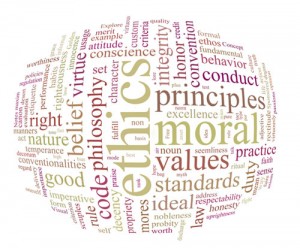 Chris Milton wrote a thought-provoking post last week, arguing that sustainability in business can be seen as more important than ethics, because a company’s ethical position is inevitably culture-biased, and therefore not globally appropriate.
Chris Milton wrote a thought-provoking post last week, arguing that sustainability in business can be seen as more important than ethics, because a company’s ethical position is inevitably culture-biased, and therefore not globally appropriate.
I don’t agree.
Sustainability is important; I’m certainly not going to argue about that. But I don’t think that sustainability should be prioritised over ethics. I think the ethical stance of a company is a higher-order decision, and must come first.
An ethical choice underpins your business model
The decision whether a company should take a sustainable approach to business or not is an ethical one.
“Does the company believe that sustainable business is right?”
Not just because it reduces cost, or because it is a popular approach, but because it is the virtuous way to behave.
(Words are tricky vessels, and arrive already freighted with cultural import. I’ve chosen ‘virtuous’ here, rather than ‘best’ or ‘proper’ or ‘right’ or ‘correct’. I’m not trying to convey any particular moral theories, but to use a word to describe a company ‘of good character’; a delightfully old-fashioned concept.)
What does the company believe?
- Many companies decide that their primary purpose is to maximise returns for their shareholders, and, for these companies, sustainability matters (if at all) because it can reduce costs, not because of any intrinsic virtue in behaving this way.
- Others decide that they’ll adopt a sustainable approach because it will improve their brand positioning: either their corporate brand or their product/service brands. This too, is a profit-driven motive, and not done out of a sense of virtue.
- And some may decide to create a sustainable business because they believe it is the virtuous thing to do – and, as Chris says, they may make a reduced profit because of that decision.
In all these cases, the end result may be sustainable business, though for different reasons, and we can surely applaud the results.
All three types of company have made an ethical decision about the relative weights of responsibility to their different stakeholders. In the case of the profit-driven companies, they may have decided that their main responsibility is to their shareholders. Others may have decided that their main responsibility is to the wider community; perhaps they operate as a co-operative. Some may decide that their main responsibility is to their employees; perhaps they work as a partnership.
Which stakeholders should take priority? How to balance responsibility to all stakeholders? This is an ethical question and the answer shapes the corporate culture and all its actions.
Ethics shapes the corporate culture
The ethical principles that the company adopts, even if this decision is not explicit, do more than simply dictate the focus of the company. They permeate the company, affecting potentially every decision and every action by all employees: provide a refund for that item possibly damaged in transit? deny that insurance claim? ‘borrow’ that stapler from Supplies? extend your payment cycle for small suppliers? demand your staff work unpaid overtime because you did? …
The ethical principles and culture are set by the senior management, and – assuming that senior management have the strength of will to stand by their principles and act accordingly – will affect anyone who has dealings with the company: all stakeholders.
There is a good reason for the existence of a mission or purpose statement; for the clear identification of the corporate values; for the development of the code of ethics and code of conduct; and for putting all these on the corporate website. These statements are the source of the corporate culture, and also the banks that direct the cultural flow in the desired direction. They are both guideposts to the ‘good’ behaviour and bulwarks against the ‘bad’.
Ethics promotes consistent and directed action
Ethics permeates business – good and bad. The tricky thing is to ensure ethical consistency, and that the ethical choices made by all employees every day are desirable.
So here’s the question: desirable in themselves, or desirable given the end-goal in mind?
Your ethics may not be mine, but if you implement them consistently across your organisation, then your organisation is at least authentic, and true to your principles. If you explicitly communicate your principles, goals and actions, then you’ve taken a step towards transparency, and your stakeholders can then decide whether or not they want to do business with you.
If you have decided that your business will be a sustainable one, then all choices should be geared towards that end.
But you can’t do without ethics.
Lucy is Editor at Corporate Eye



Very interesting Lucy, thank you very much for the response.
I think I have to say, first up, that I never intended to imply that businesses do not need ethics. They do.
What is more, as you point out, it is impossible to ignore ethics as it these which guide and inform people’s actions, and businesses are but the creation of people.
What I’m arguing is that the idea that “ethical business” is a 21st Century business model which by itself will act as a magic salve to heal the perceived failings of 20th Century capitalism is flawed,
Many readers of Corporate Eye’s CSR blog will, quite rightly, say “well I never said that”. I use a broad brush to make a point, not to damn everybody!
The reason 20th Century capitalism has got itself into such a mess is because it ended up being all about the short term year-on-year generation of money. Building towers upon towers, without looking at the foundations.
Imagine each business as a machine: it demands various resources and produces various products .. but only the volume of little green pieces of paper truly seem to matter.
Now, a fine upstanding owner of one of these machines may have one of various ethical views on life.
For instance, a former colleague of mine once got sacked for claiming his bar tab on expenses: this was specifically highlighted as a disciplinary offence in the Company Handbook, so he had to go. That business owner’s view was perfectly clear.
Or perhaps such an owner would be one of the large number of people who believe in unregulated free-market competition, who believes totally sincerely that the more money he can make, the better the world he will create.
Life becomes very awkward, if not painful, if you place such beliefs at the centre of a new way of doing business. How strong are your ethics?
If you were the first business owner, would you not do business with anyone whose expenses regulation isn’t as severe; if the second business owner would you compromise your beliefs by engaging suppliers who hold green certification?
Does this lead us to a market where companies only trade with those whose ethics they share? Ugh … wouldn’t that make the whole thing rather, well, political?
I don’t want that. I want companies to be able to engage in free enterprise according to whatever ethics their board chooses to set for them.
But I do also believe (with apologies to business owner two) that businesses have to alter their decisions making processes to ensure the ROI does not ride roughshod over everything.
I have ethics: as a Buddhist with Catholic children I have my own bag I carry around with me. But I also believe that, for the business world, sustainability should be closer to the core of a 21st Century business model than ethics.